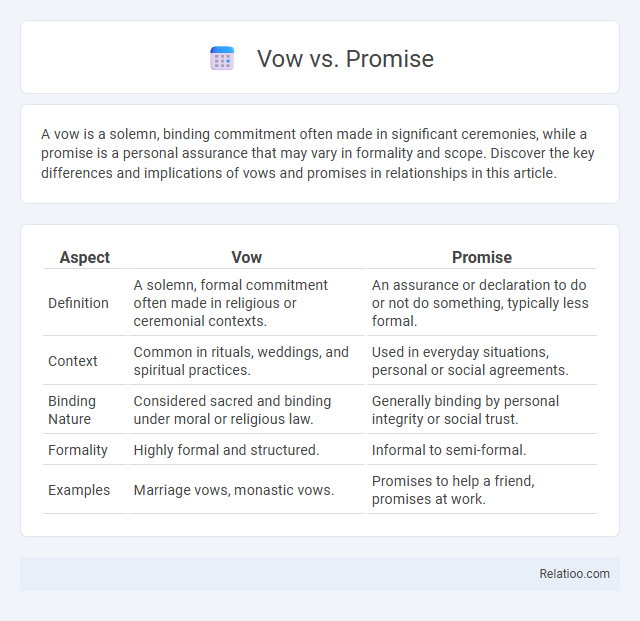A vow is a solemn, binding commitment often made in significant ceremonies, while a promise is a personal assurance that may vary in formality and scope. Discover the key differences and implications of vows and promises in relationships in this article.
Table of Comparison
| Aspect | Vow | Promise |
|---|---|---|
| Definition | A solemn, formal commitment often made in religious or ceremonial contexts. | An assurance or declaration to do or not do something, typically less formal. |
| Context | Common in rituals, weddings, and spiritual practices. | Used in everyday situations, personal or social agreements. |
| Binding Nature | Considered sacred and binding under moral or religious law. | Generally binding by personal integrity or social trust. |
| Formality | Highly formal and structured. | Informal to semi-formal. |
| Examples | Marriage vows, monastic vows. | Promises to help a friend, promises at work. |
Understanding the Concepts of Vow and Promise
A vow is a solemn, formal commitment often made publicly or in a ceremonial context, emphasizing deep personal or spiritual significance, while a promise is a more general assurance or commitment that can be informal and personal. Understanding the concepts of vow and promise involves recognizing that vows carry a stronger moral or emotional weight, often invoking a sense of duty or sacredness. Your ability to differentiate between the two helps clarify expectations and the seriousness behind commitments in various relationships and situations.
Key Differences Between a Vow and a Promise
A vow is a solemn, formal commitment often made in religious or ceremonial contexts, while a promise is generally a voluntary assurance to do or refrain from something. Vows typically involve a higher level of seriousness and binding intent, frequently invoking moral or spiritual consequences, whereas promises can be casual and less binding. The key difference lies in the context, gravity, and implications, with vows carrying a deeper obligation beyond ordinary promises.
Historical Origins of Vows and Promises
Vows and promises share historical roots in ancient legal and religious traditions, where vows often involved solemn commitments to deities, embodying sacred obligations in cultures such as ancient Rome and early Christianity. Promises, by contrast, emerged as personal or social contracts grounded in mutual trust and honor, dating back to early human societies for securing agreements and cooperation. The term "vow" is typically linked to formal, ceremonial acts, while "promise" indicates more flexible, everyday assurances, reflecting their distinct roles in historical social structures.
Types of Vows: Religious, Legal, and Personal
Types of vows include religious vows, which are solemn commitments made in sacred contexts such as marriage or monastic life, often involving lifelong dedication. Legal vows refer to formal promises recognized by law, including oaths taken during court proceedings or marriage ceremonies. Personal vows are individualized commitments reflecting personal goals or values, frequently used for self-improvement or ethical pledges without legal or religious binding.
Common Situations for Making Promises
Common situations for making promises include personal relationships, where you assure trust and commitment, such as promising to support a friend or loved one. Professional settings also require promises, like guaranteeing project deadlines or meeting work obligations to maintain reliability. Your ability to distinguish vows, promises, and pledges ensures clear communication of intent and responsibility in various social and formal contexts.
The Emotional Weight of Vows vs Promises
Vows carry a deeper emotional weight than promises due to their association with sacred or solemn commitments, often made in contexts like marriage or religious ceremonies. While promises can be casual and made in everyday interactions, vows are imbued with a sense of duty, honor, and lifelong dedication. The emotional resonance of vows stems from their formal nature and the profound trust they represent between individuals.
The Role of Language in Expressing Commitment
Language plays a crucial role in expressing commitment through the nuanced differences between vow, promise, and oath. A vow typically signifies a solemn, often spiritual pledge, reflecting deep personal or religious dedication, while a promise generally conveys a personal assurance or intention between individuals. An oath involves a formal, legally or ethically binding declaration, emphasizing accountability and the seriousness of the commitment in both social and judicial contexts.
Legal Implications: When a Promise or Vow Becomes Binding
A vow typically carries a stronger legal or moral weight than a promise due to its formal, solemn nature often recognized in contracts or religious settings. Promises can become legally binding when made in a contractual context with clear terms, consideration, and mutual consent, whereas vows generally require a formal declaration, such as in marriage ceremonies, to gain legal significance. Understanding the context and specific wording is crucial to determining when a vow or promise incurs legal obligations and enforceability.
Cultural Interpretations of Vows and Promises
Vows and promises hold distinct cultural significance, where vows often carry a sacred or formal weight within religious or matrimonial contexts, symbolizing lifelong commitment and spiritual duty. Promises tend to be viewed as personal assurances or social contracts that may vary in seriousness depending on cultural norms and individual relationships. Various cultures attribute solemn rituals and ceremonial importance to vows, reinforcing their binding nature compared to the more flexible and situational use of promises.
Which to Use: Choosing Between a Vow or a Promise
Choosing between a vow and a promise depends on the level of commitment and formality desired; a vow signifies a solemn, often spiritual or legal, commitment, while a promise generally indicates a personal assurance or intention. Vows are commonly used in ceremonies such as weddings or religious rites, emphasizing irrevocability and deep moral obligation. Promises are more flexible, suited for everyday situations where trust and reliability are conveyed without the same weight of permanence.

Infographic: Vow vs Promise
 relatioo.com
relatioo.com